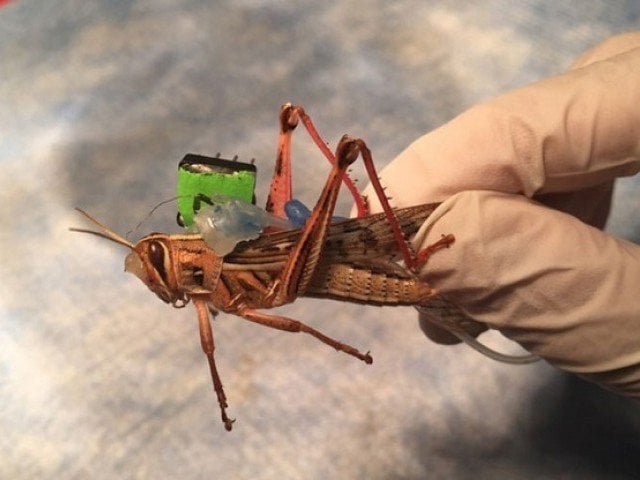The type of locust found in Pakistan is the Desert Locust (Schistocerca Gregaria), which is considered one of the deadliest insect pests. If left unchecked and untreated with pesticides, it wreaks havoc on the agricultural economy of a particular country. The Desert Locust is currently present in about 60 countries, ranging from Morocco across Africa north of the equator, through eastern Africa and the Arabian Peninsula, to Iran, and then to Pakistan and India, and vice versa.
Due to the strategic location of Pakistan, the country is affected by locust attacks during the migration of locust swarms from both the west and east. From the west, we face locust swarm attacks in Balochistan initiated from Iran, while from the east, we have to combat locust swarms entering Cholistan & Tharparkar deserts from the Indian side. Our irrigated cropping areas of Punjab and Sindh are in close vicinity to the international border.
Pakistan experienced the deadliest locust attack in 2019 and the later months of 2020, severely affecting cotton, maize, and wheat crops, causing an alarming situation in the country. In order to prevent a food crisis and address the emergency, the World Bank launched the LEAFS Project (Locust Emergency and Food Security) for Pakistan, consisting of a $200 million USD loan to tackle the locust emergency in the country.
LEAFS project was launched in 2020 with an approval cost of 200 Million USD in July 2020 with objectives to Control locust outbreak, Restore livelihoods in affected areas and Strengthen national food security monitoring & management. The LEAFS project also included three main components which were Surveillance and Control Measures, Livelihood Protection and Rehabilitation and Early Warning Preparedness and Food Security.
The aim was to Strengthen locust surveillance system by ground surveillance, Utilizing remote sensing technology and Streamlining data collection and to Implement control measures by using high quality and top notch pesticides and Test & train on risk reduction strategies. The project was streamlined with international policies and standards to tackle the issue for a good cause, but the expectedly unexpected happened which caused annoyance in authorities of World Bank.
The fund amount of 200 Million USD were reported to be misused and causing leakages of the initially allotted amount of 15-20 Million USD in purchasing Luxury products like SUVs and Laptops, in disguised of aiding Farmers or ensuring food security. The expected outcomes of the amount was assumed to provide Improved livelihoods & food security for affected communities and Strengthening of national food security monitoring & management system but the matter of concerns and priorities were different on the other side of assumptions.
In 2021, after getting strong news of misusing the funds, World Bank decided to restructure the promised amount, keeping in mind the current condition of food security of the country which hailed to be recovered from Locust attacks in the end of 2020 already. WB announced to downgrade the amount of 200 Million USD of LEAFS to 104 Million USD over the concerns of non implementation and non execution of the project since 2020 and the rating of the project over user country was rated as moderately satisfactory. The rating caused serious attention of the authorities in Govt of Pakistan.
The Project was geared up and execution of the policies and implementation of standards were kicked off with full swing. 86 entomologists and other laborers were hired to boost the project. Due to precisely, meticulously and accurately planning of concerned authorities over project, a revised plan was suggested by a department to its parent federal department. The revised plan recommended the epitome of austerity and efficiency with effective working capabilities.
The new refined and revised planned narrated about the utilization of 200 Million USD of LEAFS project. The only 114 Million was recommended to be allotted for Food emergency in total. However, 96 Million USD was requested to be used from LEAFS fund and 104 Million USD was decided to be surrendered to WB as the locusts issue had already tackled by the Govt of Pakistan, amicably. So the remaining 96 Million USD was re routed to be used for Flood affectees, focusing on Providing wheat and oil seeds to flood-affected farmers and Strengthening food security system.
As a matter of fact, the proposal was approved by Parent department on sincere efforts and proposal by child department without any approval by WB or the WB did not feel necessary to respond on the so called revised proposal.
In January 2024, all of a sudden WB terminated the LEAFS project which was derailing since 2020, and the things had reached the peak of unacceptable irregularities since 2022 and 2023 and the final blow to the project was given in Jan 2024, declaring the project as terminated with rating to “highly unsatisfactory” performance with enormous irregularities in project implementationn. The Ministry responsible for project implementation, hired 86 entomologists for locust and invasive pests control in March 2023 and were terminated in Karachi with seven months of outstanding salaries.
Moreover, the termination of employees lacked the mandatory one-month notice prior to their termination which is obligatory and customary to inform the outgoing employee. Currently, Terminated Employees have Appealed the govt of Pakistan for adherence to their labour rights and waiting for the final verdict by Supreme Court of Pakistan, which we all know as a nation that the matter will die down or will be given a least priority by worthy supreme court because they are busy in jeopardizing the fame and name of some influential figure.
The level of meticulous professionalism depicted in the LEAFS project must not ever be forgotten, we as a state or some departments of state have supposedly failed to understand the value of foreign investments, loans and Aids. They are required and supposed to be utilized for the betterment of state and functioning of state. But, it a matter of concern to feel that we as a nation have the deep priorities of deep pockets.
